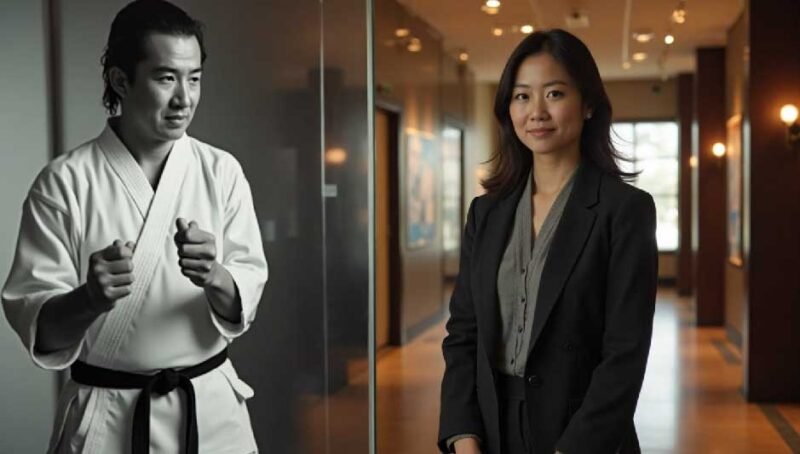Pat Morita created one of cinema’s most beloved characters—Mr. Miyagi in “The Karate Kid.” His daughter Aly Morita carries this powerful legacy today. Her father’s iconic role transformed Asian American representation in Hollywood, though it brought complex challenges to his career. Pat Morita later shared his struggles with typecasting, which reflected a common dilemma many actors of color face with breakthrough roles.
Aly has become a strong voice for authentic Asian American representation in media. She spoke out against the 2010 remake of “The Karate Kid” and highlighted issues with cultural misrepresentation that confused Kung Fu with Karate. Her steadfast dedication to protecting Japanese American history shows in meaningful ways. She donated her father’s Army uniform from the film to the Japanese American National Museum. Her writing explores themes of identity and heritage that echo her personal journey and the Asian American community’s challenges.
Early Influences and Family Legacy
Life as the daughter of Noriyuki “Pat” Morita meant Aly Morita had to navigate a complex legacy. Her father’s remarkable story started with hardships that shaped his artistic nature and later influenced her outlook on life.
Pat Morita faced severe challenges in his childhood. He got spinal tuberculosis early in life and spent his young years in a body cast at San Francisco’s Shriners Hospital. The ward’s radio sparked his passion for comedy and drama during this period. He learned to walk at age 9, but life dealt another blow. An FBI agent took him straight from the hospital at age 11 to join his parents at the Gila River incarceration camp in Arizona.
The Morita family relocated to Tule Lake to be with Pat’s maternal grandfather and uncle. His early life of isolation, confinement, and discrimination built the foundation of his resilience and artistic nature.
Aly saw her father’s constant battles in the entertainment world. She wrote openly about how fame and typecasting took a heavy toll on him. She noted, “The first Karate Kid film was both his most rewarding and most damning experience in show business: It gave him validation for his talent and catapulted him onto the map of celebrity, but also ruined his sense of self and purpose”.
Pat Morita’s personal relationships were multifaceted. He married Kathleen Yamachi in 1953 at age 21, and they had a daughter, Erin. After their divorce in 1967, he married Yukiye Kitahara in 1970, becoming father to Aly and Tia. This marriage shaped Aly’s early years.
The precious moments Aly spent alone with her father showed his true character. She remembered, “These were the only times I had my dad to myself. Someone always accompanied him… there could be an assistant, publicist, bodyguard, family member, fan, leech, struggling writer, actor, director, floozy, community leader, politician or just someone who wanted my dad to do or be something he was not”.
These experiences shaped Aly’s views on identity, representation, and authentic storytelling. Her father’s path from a hospitalized child to an Academy Award nominee who ended up as what she called “a forgotten star” taught her about fame’s temporary nature and the unique challenges Asian Americans face in entertainment.
Aly Morita’s Voice as a Writer and Activist
Aly Morita has become a powerful voice for authentic Asian American representation in media over the last several years. She found her calling after seeing how Hollywood’s typecasting affected her father’s career and mental health. Unlike other celebrity children who use famous last names for personal gain, Aly dedicates her platform to cultural advocacy and historical preservation.
She spoke against the 2010 remake of “The Karate Kid” with Jackie Chan and pointed out its cultural flaws. “They’re calling it ‘The Karate Kid,’ but they’re actually doing kung fu,” she said. Her criticism highlighted Hollywood’s tendency to blend different Asian cultures for Western audiences.
Aly works hard to preserve Japanese American history. She donated her father’s Army uniform from “The Karate Kid” to the Japanese American National Museum. This ensures that future generations will have access to these important cultural artifacts.
Her writing delves deep into identity, cultural heritage, and immigrant experiences. She often writes about growing up Japanese American on Hollywood’s edges. Through her essays and social media posts, she shows people who her father really was behind the camera. This helps fans see the real person behind the character they loved.
Aly shares stories about her father’s life that many don’t know. She talks about his time in a tuberculosis ward and his experiences in Japanese American incarceration camps during World War II. These stories preserve her family’s history and teach others about a dark chapter that affected countless Japanese American families.
She champions authentic Asian American storytelling in film and television. Her message stays clear – proper representation matters, not tokenism or stereotypes.
Preserving History and Advocating for Change
Aly has made preserving Japanese American history a key part of her life as Pat Morita’s daughter. She shows her dedication through her work with cultural institutions. She donated her father’s Army uniform from “The Karate Kid” to the Japanese American National Museum. This valuable piece of Asian American cinema history will remain available to future generations.
Ralph Macchio and director John G. Avildsen joined Aly at the Japanese American National Museum to celebrate “The Karate Kid’s” 30th anniversary in 2014. The event showcased how her father’s portrayal of Mr. Miyagi brought new depth and humanity to Asian American characters in mainstream movies.
Aly’s work goes beyond preservation. She actively challenges stereotypical portrayals. She suggested people “wait for the DVD or Netflix” when “The Karate Kid” remake came out in 2010. Her message was clear: “It’s been 25 years since the original came out, and we’re still dealing with the same stereotypes. Where are the other roles for Asian American actors? Why is the karate master the one role that people can respond to?”
Her perspective comes from personal experience. “Growing up, I always struggled with fact that my father played Mr. Miyagi as my own identity politics started to form,” she shared. “I’ve come to my own personal peace with it”. This shift from personal conflict to public advocacy shows her growth as a cultural critic.
The problems run deeper than just one movie in Hollywood. She raised a powerful question: “Maybe we should boycott every movie that’s not representative of who we are as people”.
Today, Aly continues to support initiatives that advance diverse storytelling. She works with organizations and speaks on panels to help create a more inclusive media world.
Conclusion
Aly Morita’s story shows her dedication to honoring cultural heritage and pushing for real change. She turned what could have been a heavy burden of being “Mr. Miyagi’s daughter” into something positive. Her platform now champions authentic representation and preserves history. She spoke out against the 2010 “Karate Kid” remake because it showed how Hollywood still doesn’t deal very well with cultural identity.
Her father Pat Morita’s complicated relationship with fame shaped Aly’s view on celebrity culture and representation. She saw how typecasting ended up hurting her father’s identity. All the same, she took on the role of protecting his legacy in film. She proved this dedication by donating his Army uniform to the Japanese American National Museum.
Aly does more than just preserve memories. She pushes the entertainment industry to move beyond stereotypes and token roles. Her advocacy highlights the limited opportunities for Asian American actors – a situation that hasn’t changed much since her father’s time.
She shares the lesser-known parts of her father’s life that people should know about. His childhood illness, time in incarceration camps, and the real person behind the famous character paint a complete picture. These personal stories connect her family’s history to the broader Japanese American experience. They build a bridge between past hardships and today’s representation challenges.
The Morita name means more than just a beloved movie character. Aly’s ongoing work includes a family commitment to real storytelling, cultural preservation, and better representation. She reminds everyone that real people with complex lives exist behind iconic characters – a truth future generations need to know.








